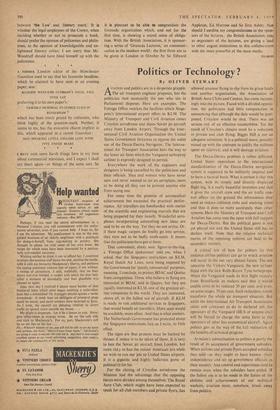Politics or Technology?
By OLIVER STEWART A/ATION and politics are in a desperate grapple. The air transport engineer proposes, but the politician (not necessarily the one who sits in Parliament) disposes. Here are examples. The Foreign Office restricts the facilities which Singa- pore's international airport offers to KLM. The Ministry of Transport and Civil Aviation closes Croydon aerodrome and shoos Soviet jet aircraft away from London Airport. Through the Inter- national Civil Aviation Organisation the United States Government threatens to oppose the wider use of the Decca-Dectra Navigator. The Interna- tional Air Transport Association bars the way to the lower air fares which the Vanguard turboprop airliner is expressly designed to permit.
Everywhere the work of the engineers and designers is being cancelled by the politicians and their officials. Men and women who have never seen and never wanted to see an aeroplane, seem to be doing all they can to prevent anyone else from seeing one.
For some time the promise of aeronautical achievement has exceeded the practical perfor- mance. Air travellers are bombarded with stories of the scientific and engineering marvels that are being prepared for their benefit. Wonderful aero- planes incorporating astonishing new ideas are said to be on the way. Yet they do not arrive. Or, if these magic carpets do finally go into service, they turn out to be badly moth-eaten. It means that the politicians have got at them.
That convenient, dimly seen, figure-in-the-fog, a 'Foreign Office spokesman' told me, when I asked, that the Singapore restrictions on KLM, Royal Dutch Air Lines, were being imposed by the Government for 'purely commercial' purposes, meaning, I conclude, to protect BOAC and Qantas from competition. Those who believe in flying are interested in BOAC and in Qantas; but they are equally interested in KLM, one of the greatest air- line companies in the world. They are interested, above all, in the fullest use of aircraft. If KLM is ready to run additional services to Singapore, that would benefit air travellers. More seats would be available, more often. And that is what matters.
The Netherlands Government has protested about the Singapore restrictions, but, as I write, to little effect.
The signs are that protests must be backed by threats if notice is to be taken of them. It is easy to ban the Soviet jet aircraft from London, but more risky to ban the noisier American jets while we wish to run our jets to United States airports. It is a gigantic and highly ludicrous game of political tit for tat.
For the closing of Croydon aerodrome the Minister had the advantage that the opposing forces were divided among themselves. The Royal Aero Club, which might have been expected to speak for all club members and private flyers, has allowed amateur flying to slip from its grasp lately and another organisation, the Association of British Aero Clubs and Centres, has come increas- ingly into the picture. Faced with a divided opposi- tion, the politicians had little compunction in announcing that although the date would be post- poned, Croydon would be shut. There was no serious risk of an effective counterblow. Yet the result of Croydon's closure must be a reduction in private and club flying. Biggin Hill is not an adequate substitute. It is a political move, possibly mixed up with the attempts to justify the millions spent on Gatwick, and it will damage aviation.
The Decca-Dectra problem is rather different. United States opposition to the international standardisation of the Decca-Dectra navigation system is supposed to be militarily inspired and to have a tactical basis. What is certain is that this system, with its simply and directly displayed flight log, is a really beautiful invention and that it gives the aircraft crew and the air traffic con- trol officer on the ground the information they need to reduce collision risks and stacking times and that it does so more accurately than other systems. Here the Ministry of Transport and Civil Aviation has come into the open with full support for Decca-Dectra. But the political game is not yet played out and the United States still has to declare itself. Note, that the relative technical merits of the opposing systems are held to he secondary matters.
A critical test of how far politics (in this instance airline politics) can go to wreck aviation will occur in the not very distant future. The test concerns the Vickers Vanguard, the new airliner fitted with the new Rolls-Royce Tyne turboprops. When the Vanguard made its first flight recently from Brooklands its makers said that it would enable costs to be reduced 30 per cent. and even, on some stages. 50 per cent. Such reductions 11 outst transform the whole air transport situation. But while the International Air Transport Association exists and continues to do its declared job, the operators of the Vanguard (BEA or anyone else) will be forced to charge the same fares as the operators of other less economical aircraft. Again politics gets in the way of the full realisation of the benefits of technical progress.
Aviation's subordination to politics is partly the result of its acceptance of government subsidies. When airlines and private flyers accepted subsidies they sold—as they ought to have known--their independence and set up government officials as their masters. And control and supervision tend to remain even when the subsidies have ended. If the fullest use is to be made in the future of the abilities and achievements of our technical workers, aviation must, somehow, break away from politics.






































 Previous page
Previous page